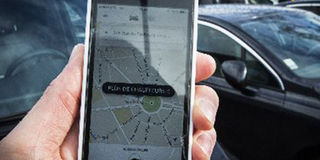How technology liberates and disrupts

A user displaying the app for taxi service Uber on January 9, 2016 in Paris. Mobile devices are central to this revolution. PHOTO | AFP
What you need to know:
- Traditional business models have been replaced by new ones that are easier, faster and cheaper.
- The online rating helps build confidence and trust on the service or product.
Since year 2000, the world has greatly increased the power of computing.
The hardware, software and broadband has grown exponentially.
Technology has boosted the quality of voice and the speed of data.
We now live in an interconnected society that spans beyond borders.
The concept of a global village has never been so lucidly manifested.
Fuelled by this tech power, we are on an accelerated lane from analogue to digital.
Everything analogue is being turned digital, sensed, stored and analysed into information, and then converted to knowledge.
This knowledge is being optimised to change the world politically, economically and socially.
Traditional business models have been replaced by new ones that are easier, faster and cheaper.
Take the Uber taxi hailing business model.
Uber users rely on technology to request a taxi, enjoy or endure the service and then pay for it through one of several convenient options.
VITALLY NECESSARY
After the ride, the passenger rates his experience, and the driver rates the customer’s behaviour.
The rating is the feedback to the driver and other riders.
How the driver uses the feedback determines whether he keeps or kills his business.
On the other hand, a good customer wants to maintain high ratings to keep getting Uber rides when he needs them.
It doesn’t require complex analysis to notice that all industries are becoming computable.
When an industry is being digitised, it becomes democratised and disrupted.
To join taxi business before Uber came into being, one needed to go through costly and time-consuming procedures.
Now anyone can own and operate a taxi.
Technology liberated and democratised the business.
Many other businesses have taken this path and, in less than 10 years, they are billion-dollar businesses.
OTHER VENTURES
What’s surprising, these businesses have no merchandise.
They use technology to connect a customer with goods and services, and get paid for it.
As Tom Godwin, senior vice president of strategy and innovation at Havas Media observed in 2015, “Uber has the world’s largest company but owns no vehicles.
"Facebook, the world’s most popular media owner, creates no content.
"Alibaba, the most valuable retailer, has no inventory.”
He added: “Airbnb, the world’s largest accommodation provider, owns no real estate.”
Airbnb, a popular room-renting company, was born in a few short years.
It is now bigger than a century-old Hilton, Marriot and Starwood combined — even though, unlike these hotel chains, Airbnb doesn’t own a single bed.
It has listed over three million homes and rooms.
During the last World Cup in Brazil, for example, 120,000, or 23 per cent of international travellers rented their rooms through Airbnb.
The Airbnb hosts in Brazil, according author Thomas Friedman, earned roughly 38 million dollars (about Sh3.8 billion) from reservations during the World Cup.
Just like Uber, a rating system is involved — the service provider and the client rate each other.
NEXT MOVE
The online rating helps build confidence and trust on the service or product.
Prospective clients review the ratings from previous service users and make a decision on whether to buy or shop further.
Uber and Airbnb are just two examples.
Amazon, Safaricom, Paypal, Alibaba, Massive Open Online Courses and many other tech-based businesses are built on similar principles.
They have broken ranks with traditional rules of business and made billions in a few short years.
Reason? Technology democratises, liberates and disrupts.
Mobile devices are central to this revolution.
This is best summarised in a 2015 study, The Mobile Revolution: How Mobile Technologies Drive a Trillion-Dollar Impact.
One of the questions asked to participants in this multi-country study was, “Between a mobile phone and sex, what would you give up for a year?”
Overall, 38 per cent of respondents said they would give up sex but keep their phones.
It is 2017, which way would you go? Happy New Year!
Wambugu is an informatics specialist. [email protected] @samwambugu2





